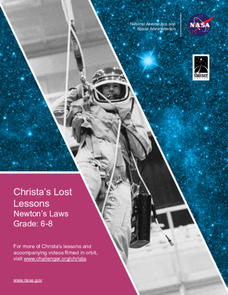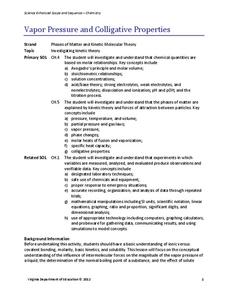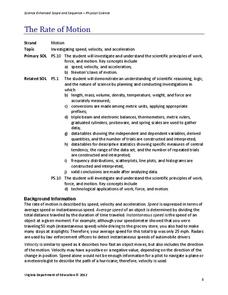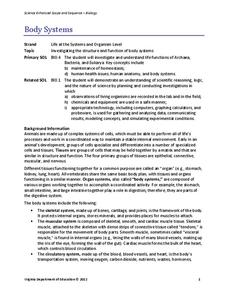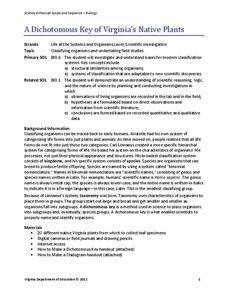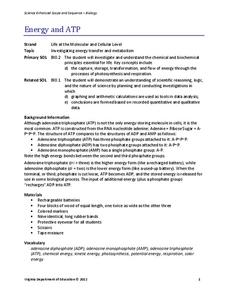Virginia Department of Education
The Cycles of Nature
Encourage peer collaboration and assist with the creation of visual aids to identify carbon, water, and nitrogen cycles as your class learns more about nature. They discuss relative information, create a visual aid...
Virginia Department of Education
The Ratio of Surface Area to Volume
Demonstrate the ratio of surface area to volume in your high school class by using phenolphthalein, gelatin, and an onion. Intrigue the class by leading a discussion on osmosis and diffusion, then making "scientific jello." Participants...
Brain Scape
SAT Vocab
Whether preparing for the SAT or just interested in increasing your vocabulary, here's an app that will provide succor to learners desirous of obviating the anxiety associated with the study of esoteric language.
NASA
Christa's Lost Lesson: Newton’s Laws
How do the laws of motion work in space? Learners explore Newton's laws of motion in different experiments as part of the Christa's Lost Lessons series. They rotate around the room in three stations to experience each law in action using...
Virginia Department of Education
Igneous Rocks
High schoolers explore igneous rocks by observing rock samples and considering cooling rates and composition. The third installment of a five-part geology series culminates in an activity where learners use igneous rock...
Virginia Department of Education
Metamorphic Rocks
Rocks can bend? Pupils investigate how heat and pressure produce metamorphic rocks by modeling them using clay, and then categorize samples based on observable characteristics. The lesson ends with a metamorphic rock identification...
Virginia Department of Education
Vapor Pressure and Colligative Properties
Hate to vacuum, but enjoy using a vacuum pump? Explore a lesson plan that starts with a demonstration of boiling water at various temperatures by using a vacuum pump. Then scholars design their own experiments to measure vapor pressure...
Virginia Department of Education
Sound
Add a little music to your next physics class. Pupils discuss how frequency determines pitch and take part in several activities designed to teach them more about sound, melody, resonance, and vibrations. They use materials to construct...
Virginia Department of Education
The Rate of Motion
How much time does it take to jump over three balloons? Pupils calculate the speed of tasks that require different motions. They determine motions for tasks such as walking, skipping, hopping, and jumping before creating a...
Virginia Department of Education
Body Systems
The human body is an amazing thing! Explore the body with your high school class as they investigate each system in detail. They learn components of each organ system and disease processes that can negatively affect general health and...
Virginia Department of Education
Mendelian Genetics
How did Mendel know which pea plants would demonstrate certain characteristics? Pupils explore the answer this question, among others, as they complete Punnet squares, research dominant and recessive traits, and explore hereditary...
Virginia Department of Education
A Dichotomous Key of Virginia’s Native Plants
Can your class correctly classify plant species? Individuals explore native plants of the local environment and correctly classify them into their respective categories. They investigate differences in the plants and discuss similarities...
Virginia Department of Education
Structure and Function of Cell Membranes
Lead your high school class on an exploration inside the cell. Individuals investigate the relationships between cells structure and function given their relative locations on the cell membrane. They explore the concept of homeostasis...
Virginia Department of Education
Classification of Organisms
Searching for the perfect indoor/outdoor activity that allows class members the opportunity to learn about organism classification? Here, pupils research organisms and categorize them according to domain and kingdom over the course...
Odell Education
Plant and Animal Cells
Incorporate multiple facets of the cell into your next high school lab! Through an introduction to cell organelles, class members observe each cell type and draw visuals to further demonstrate understanding of cellular processes in both...
Virginia Department of Education
Animal Phyla and Plant Divisions
Searched hours for an activity that allows individuals the ability to use multiple resources to learn about both plant and animal kingdoms? This discussion and activity provide pupils with the ability to visualize each organism...
Virginia Department of Education
The Modern Model of Atomic Structure
The difference between atomic mass and atomic number can be confusing for some young chemists. Help your class better understand the concepts by allowing them to sketch an atom on paper and then discuss their experience. Upon completion...
Virginia Department of Education
Chemical Bonds
How are chemical bonds similar and how are they different? Provide your young chemists with the resources to more thoroughly understand the concepts of ionic and covalent bonds. Pupils research these topics, diagram examples of each...
Virginia Department of Education
The Law of Conservation of Matter
The Law of Conservation of Matter can be complex for young scientists to fully grasp. Use this experiment to help simplify the process as pupils perform two experiments to determine mass: one that melts a substance and the other that...
Virginia Department of Education
States and Forms of Energy
Energy is just energy, right? Explain various forms of energy to your young scientists by using an interactive experiment that contains common objects to demonstrate complex concepts. Pupils conduct experiments for radiant, thermal,...
Virginia Department of Education
Energy and ATP
Take charge of your biology class by using this exciting analogy to relate the ATP process with batteries. Pupils use batteries and rubber bands to simulate the phosphate bonds between molecules in the body. They measure the distance in...
Virginia Department of Education
Predator-Prey Simulation
Do your pupils have the misconception that environmental predators are "bad" and harm smaller creatures? The simulation explains, in detail, the important role predators play in maintaining a stable ecosystem. Through web-based research,...
Virginia Department of Education
Ecosystem Dynamics
Searching for an eccentric way to enhance lessons on ecosystems while ensuring pupils remain creative and motivated? Upon viewing The Lorax by Dr. Seuss, designated groups design and construct a pop-up book that...
Virginia Department of Education
Building a DNA Model
It has been decades since the discovery of DNA. Still, activities such building this DNA model allow blossoming scientists to better understand the components that form this overall structure. During this activity, they will also...
Other popular searches
- Science Test Preparations
- Science Test Preparation 2
- Primary Science Fair Testing
- Fair Testing Science





